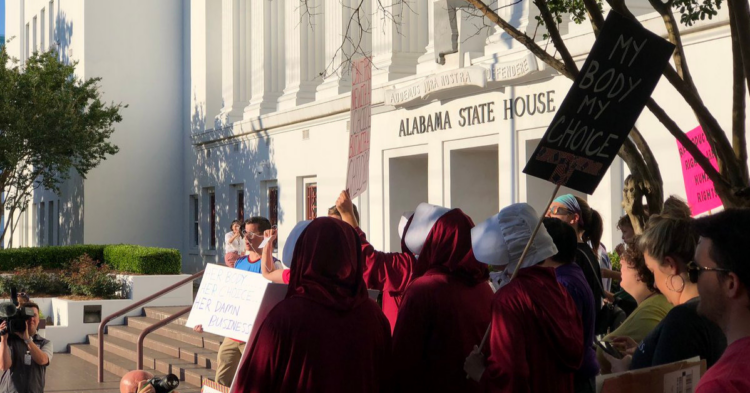The most famous example of a boycott effecting social change is South Africa. It took several decades, but more and more, the world turned its back on South Africa over its racist apartheid policies, increasingly refusing to buy its consumer goods, getting it ousted from the Olympics, among other things, until the country finally abandoned apartheid.
So, boycotts can work, and some think that might be the best way to make some changes in the U.S. as well.
Alabama’s new abortion law, the Human Life Protection Act, was always going to be a massive lightning rod in America.
It was designed to be that way. The bill’s sponsors said that the extreme measures in the law, including a lack of exemptions for cases of rape and incest, were intended to challenge Roe v. Wade before the Supreme Court, NPR reported.
So, to absolutely no one’s surprise, the backlash against Alabama’s abortion law, as well as similarly highly restrictive laws passed in Georgia, Ohio, and Missouri, has been massive.

Women all over the nation have been sharing harrowing tales of their own abortions on social media, including celebrities such as Milla Jovovich and Jameela Jamil, under the #YouKnowMe hashtag, to show how many of us actually know someone who has had an abortion, and to reduce some of the stigma around abortions.
Now, economic retaliation is on the table as well.
Officials in states including Maryland and Colorado have called for a variety of measures to push back on Alabama. Maryland’s Comptroller, Peter Franchot, has said that he will suggest his state’s $52 billion pension fund divest its assets in Alabama, as well as “a complete and thorough review of all relationships that we have with businesses located in the State of Alabama.”
In a scathing Facebook post, Franchot called Alabama’s law “a malicious assault on the rights and protections of women everywhere.”

“I obviously have no direct control over the behavior of Alabama lawmakers who would thrust their religious interpretations upon those they are paid to represent, and who choose to weaponize their system of laws to punish women who are already experiencing great vulnerability,” he wrote .
“However, I can work to ensure that Maryland’s taxpayer dollars are not used to subsidize extremism. Furthermore, experience has shown that MONEY is the one thing that matters more to people of this caliber than their religious prerogatives.”
Franchot is also asking state employees to avoid traveling to Alabama.
Officials in Colorado have made a similar request – well, not so much a request as an order. Colorado Secretary of State Jena Griswold clearly stated in a tweet that she would not authorize spending any state funds on travel to Alabama. She has also called for the Election Center, which trains election officials from across the country, to leave Alabama, according to The Mercury News .
Pennsylvania hasn’t gone to quite the same lengths, but its governor did make a stand for defenders of Roe v. Wade.

Governor Tom Wolf went on Twitter to say that he would “any anti-choice bill that lands on my desk. I won’t let our commonwealth go backward on reproductive rights.”
Online, the hashtag #BoycottAlabama is getting plenty of attention.
After Georgia passed its anti-abortion law, several film production companies pledged to not film in the state while that law is on the books, according to NBC News . Many folks online want similar pledges for Alabama, calling for boycotts of products made in Alabama like Mercedes-Benz cars or broiler chickens.
While not everybody supports the idea of boycotting Alabama, Georgia, Ohio, and Missouri, history has shown that economic forces can overturn controversial legislation, and we’ve seen it happen recently.
In 2017, North Carolina passed a bill that would bar transgender people from using the bathroom of their choice, but widespread opposition forced the state to repeal that legislation. One of the major factors was the NCAA’s decision to not allow North Carolina to host any championship games until the legislation was repealed.
h/t The Mercury News

















































